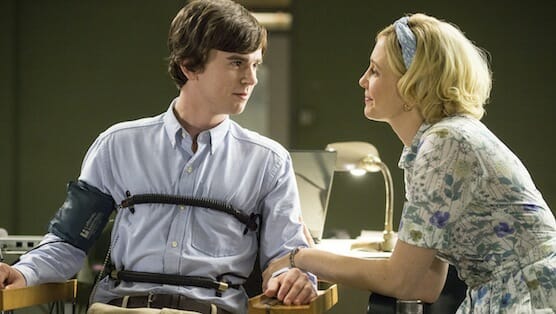When Bates Motel’s second season started, Norman Bates was unaware of the darkness that lies within him. He left Blair Watson’s house covered in blood feeling guilty, yet not knowing where this guilt was coming from. As the second season ends, with a perfect homage to the final shot of Psycho, Norman is aware of the evil he is capable of. What’s even worse is that he lacks the guilt that these actions should bring.
Much like Norman Bates, Bates Motel has done a lot of growing this season, finally nailing the tone of what this show should be: not overly ridiculous with just enough winks at the film that fail to be distracting. Bates Motel’s strength this year comes from focusing on the incredible dynamic between Norman and Norma Bates. This show should be about them and their relationship and how it effects this entire town, either directly or indirectly. Last season, Vera Farmiga and Freddie Highmore were doing a good job, but this year, the scenes they’ve shared have been particularly impressive.
“The Immutable Truth” that the title refers to is that all of these characters are doomed. After being trapped in a box, Norman has been secluded from his mother. He realizes that he most likely did kill Blair Watson, and that his blackouts cause him to do terrible things. Bates Motel is smart not to just turn him into one of the most infamous monsters of all time, but to make us sympathize with him. Here, once he understands what he can do, he creates a list, which one could assume is things he would like to accomplish before he takes the polygraph test that Sheriff Romero wants him to take, possibly incriminating himself. But instead, it’s a bucket list of things we wants to do before he kills himself.
He first talks to Emma, explaining why the family has kept her at a distance, and asks her to reconsider quitting the hotel. With his upcoming suicide, Norman wants to know that there will be someone there for Norma to fill the void he’ll be leaving in her life. After a season of Norman and Norma’s relationship breaking down, Norman starts to patch things up, having a nice dinner with his mother with an apple pie for dessert (another item on the list and an example of how Norman is still a nice, innocent boy longing for the simple things). He puts a record on and dances with his mother like they used to when he was younger.
With the polygraph test looming in the near future, Norma buys three tickets to Montreal to protect her youngest from mental institutions or possibly jail. Norma meets up with Dylan in a surprisingly sweet moment, where she states that she also bought Dylan a ticket, to which he hugs his mother for the first time. Dylan has always wanted a family, yet he’s been afraid of letting Norma getting too close. By the end of the episode, Dylan has once again found his seat at family dinners.
Unfortunately, with both of the local drug businesses out of commission thanks to Romero and Dylan killing the two kingpins, that leaves the town’s economy in a shaky state. Romero points out that Dylan knows how to play by the rules, and places Dylan at the head of the town’s booming weed business. At the very least, this takes the show out of the problematic drug war storyline that has been one of its only weaknesses.
When Norma comes home from reconciling with Dylan and deciding to stay in town, she finds a suicide letter from Norman. She and Emma find him in the woods with a gun. He doesn’t want to be who he is and doesn’t want to hurt Norma, which we all know he eventually will. But Norma finally tells him the truth about his blackouts, and the danger he can cause—and has caused. Norma says that she’ll die if Norman leaves.
What’s been so great about Bates Motel in this second season is the truth to the tragic necessity for Norman and Norma to be together. Norma can become a mess without her son, and Norman needs someone to balance himself. This balance starts to falter as Norman goes for the polygraph test. He answers every question truthfully, but pauses when the question of whether or not he killed Blair Watson comes up. He sees his mind’s version of Norma, telling him what he wants to hear, which is to lie about Watson’s death. He passes the test and Norman is off the hook for now, but he’s even more dangerous. He can survive without Norma, yet he still has the Norma in his head that he can sway to do what he wants. When Norman Bates gives that stare and smile at the camera, we know he has finally become aware of what he is capable of and how he can reason with it within himself. Norman has just become his own worst enemy, and an enemy to those around him.
The first season of Bates Motel offered very little hope for what we would see in the second season. It came off like a completely unnecessary look at a villain that weakened the source material. Yet with a focus on character and the family dynamics of the Bates family, this second season has become wonderfully contrary to its initial impressions. This show finally knows what it needs to do with its story, slowly moving towards the events of Psycho, and that direction has resulted in fully-formed characters and fleshed-out ideas. As the darkness comes with the third season, Bates Motel is at the height of its game.
